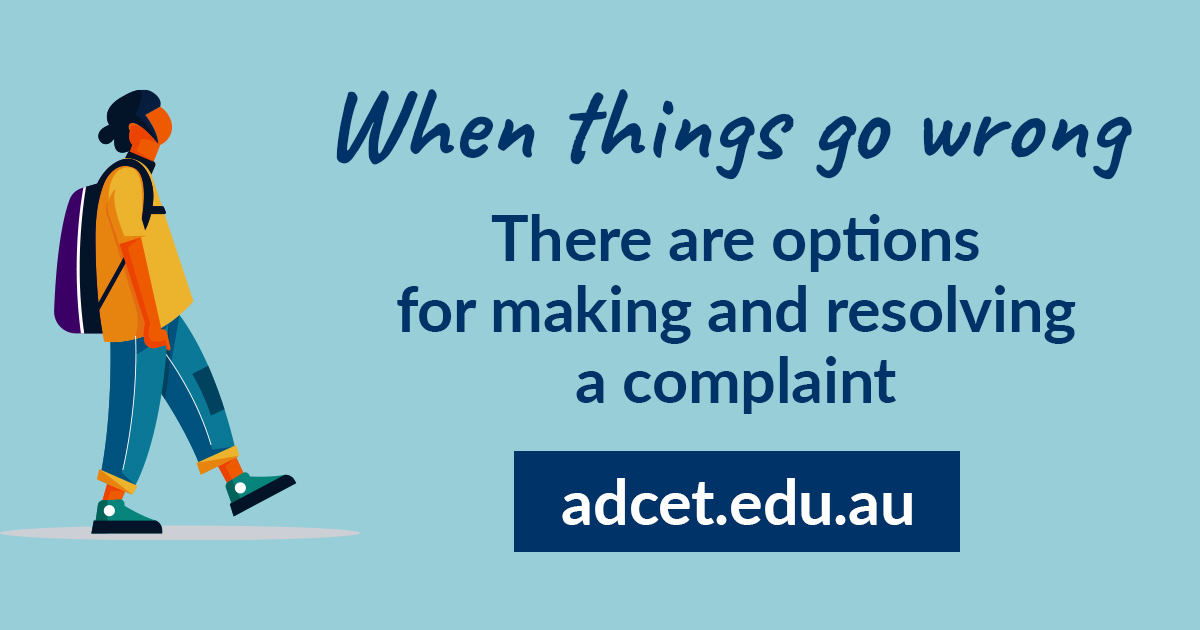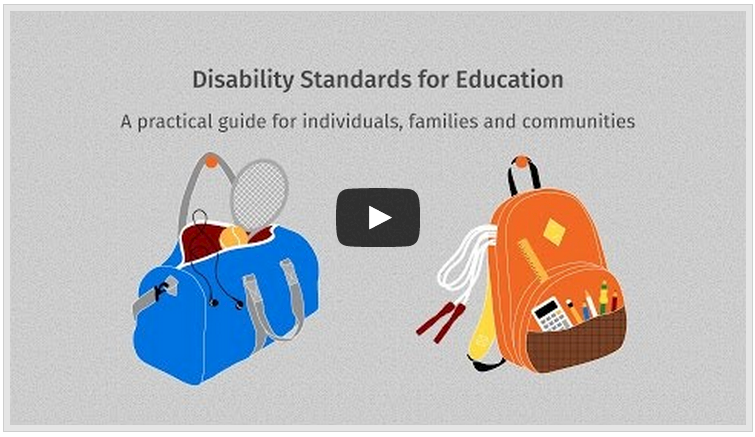Disability Standards for Education
The Disability Standards for Education1 clarifies obligations under the DDA in relation to education and training. The effect of the Standards is to give students and prospective students with disability the right to education and training opportunities on the same basis as students without disability. This includes the right to comparable access to services and facilities and the right to participate in education and training unimpeded by discrimination, including stereotyped beliefs about the abilities and choices of students with disability. However, the measures may not cover all eventualities and compliance with them may not be sufficient to prevent discrimination.
The Standards cover:
- rights of students in relation to education and training
- responsibilities of education providers
- measures which if implemented will be evidence of compliance and provide a defence against litigation.
In addition each section of the Standards are accompanied by guidance notes which are intended to assist in interpreting them.
The DDA through the Disability Standards for Education requires providers to take reasonable steps to enable the student with disability to participate in education on the same basis as a student without disability, and specifically to ensure that:
- curriculum, teaching materials and assessment and certification requirements for the course or program are appropriate to the needs of the student and accessible to him or her
- course delivery modes and learning activities (including those not occurring in a classroom) take account of the learning capacities and needs of the student and are sufficiently flexible for the student to be able to participate
- where a course includes an activity in which the student cannot participate, an alternative activity is offered that provides an equivalent experience within the context of the overall aims of the course
- study materials are available in an appropriate format for the student and the student is not disadvantaged by the time taken for any conversion that is required
- teaching strategies are adjusted to meet the learning needs of the student and address any disadvantage in the student’s learning that results from his or her disability. This includes the provision of additional support or the development of disability-specific skills
- assessment procedures are adapted to enable the student to demonstrate the knowledge, skills or competencies being assessed.
Post-secondary education providers are also required to take reasonable steps to ensure that a student with disability is able to participate and use facilities and services on the same basis as a student without disability. If a student meets the essential entry requirements, then educators must make ‘reasonable adjustments’ to the course design or delivery to enable the student to have a fair chance of participating. Individual staff members can be held liable if it is found that they deliberately or inadvertently discriminated against a student.
Who else is protected?
Because the DDA also protects people who are associates of a person with a disability are also protected from discrimination (see DDA Part 1, 1.4). So if you are discriminated against because you are a carer or friend, parent or work colleague or an advocate of a person with a disability you are also protected under both the Disability Discrimination Act and the Disability Standards for Education.
2020 Review of the Disability Standards for Education - Final Report
In 2020 the Australian Government Department of Education, Skills and Employment undertook a review of the Standards through an extensive community consultation process. The Standards are reviewed every five years to test if they are effective in achieving their objects and whether any improvements could be made.
The Final Report of the 2020 Review of the Disability Standards for Education 2005 ![]() was released on 12 March 2021. It makes 13 recommendations which reflect 4 reform directions:
was released on 12 March 2021. It makes 13 recommendations which reflect 4 reform directions:
- empowering and supporting students with disability and their families
- strengthening the knowledge and capability of educators and providers
- embedding accountability for the Standards throughout the education system
- building awareness and capability in the early childhood education and care sector.
A summary document ![]() is also available. This document explains how the Review was undertaken, what the Review was found, and what it recommends. The summary document is also available in Auslan, Easy Read, and 11 languages.
is also available. This document explains how the Review was undertaken, what the Review was found, and what it recommends. The summary document is also available in Auslan, Easy Read, and 11 languages.
Key Resources
Information products for students with disability and their parents and carers ![]()
These resources provide easy-to-use information about the Standards and offer practical advice on how to navigate the education system.

Information for students: making a disability discrimination complaint ADCET has developed information to support students who are considering making a complaint of disability discrimination.
Information for staff: Student complaints of disability discrimination ADCET’s resources supporting students who are considering making a complaint of disability discrimination are also valuable for disability practitioners seeking guidance.

Disability Standards for Education: A Practical Guide for Individuals, Families and Communities ![]()
Further Resources
References
1 Commonwealth of Australia (2006). Disability Standards for Education 2005 plus Guidance Notes. Accessed on 19 November 2014. Retrieved from https://www.education.gov.au/swd/resources/disability-standards-education-2005-plus-guidance-notes
Added December 2014. Revised July 2022

